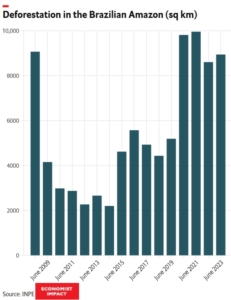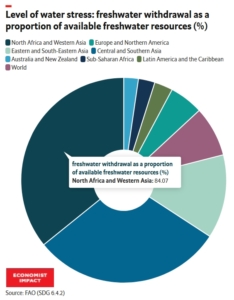Economist Impact – Is the global water crisis heating up?



The impacts of climate change and the global water crisis on people’s lives are increasingly obvious and well documented.
July 2023 was the hottest month ever recorded. Portugal, Canada, Greece, Spain, Chile, the United States and many other countries are experiencing heatwaves, droughts and severe wildfires. Iraq is facing the worst water crisis in a century. The Intergovernmental Panel on Climate Change’s Sixth Assessment Report, published in March this year, highlighted that adverse climate impacts are already more far-reaching and extreme than anticipated. Climate change has reduced food and water security, with around half of the world’s population facing water scarcity for at least one month per year. Moreover, increasing temperatures and extreme weather events contribute to the increased spread of water, food and vector-borne diseases. Ocean warming and acidification have undermined fisheries and shellfish in many communities around the world. Climate and weather extremes are increasingly driving displacement, particularly in vulnerable communities. With every fraction of a degree of warming, these impacts will intensify.
Policymakers have started putting water systems firmly on their agenda
The UN 2023 Water Conference, which took place in March in New York and followed the first “water COP” held in Egypt in late 2022, was the first UN conference on freshwater in nearly 50 years. Hundreds of water-related commitments and pledges from governments, businesses and NGOs form the Water Action Agenda aimed at addressing the global water crisis. Although these pledges alone are insufficient, they represent a first comprehensive effort to build the necessary cross-boundary and cross-sectoral co-ordination focused on water systems. The newly established Global Commission on the Economics of Water highlighted that addressing the urgent threat the world is facing—of a 40% shortfall in freshwater supply by 2030—requires fundamentally transforming the economics and governance of water. The commission aims to increase the momentum for this transformation, similar to what the Stern Review did for climate and the Dasgupta report for biodiversity economics. On a national level there has been an important breakthrough—albeit only a temporary one—on reducing withdrawals from the drought-strained Colorado River in the US. And in Brazil, deforestation of the Amazon—a crucial component of the global hydrological cycle—has finally started to slow.
However, greater international political and financial co-operation is crucial for tackling the global water crisis.
The Paris agreement’s Global Stocktake—which assesses the global response to the climate crisis every five years—will be completed for the first time ever at COP28. This is a crucial opportunity to create momentum at the highest political level for correcting the course and putting water at the heart of the global climate agenda. Funding necessary adaptation measures in developing countries, reforming water and food subsidy systems, and addressing loss and damage require deep collaboration across borders and sectors. It is vital that water and nature-based systems become a much more prominent part of the revised Nationally Determined Contributions (NDCs) and the global climate response.
Economist Impact
with our vast experience in water through key initiatives such as the Blue Peace Index, the recently concluded World Ocean Summit, Back to Blue and the City Water Index—is well placed to make sense of these complexities and to catalyse progress on the road to the UN Water Conference, COP and beyond.
